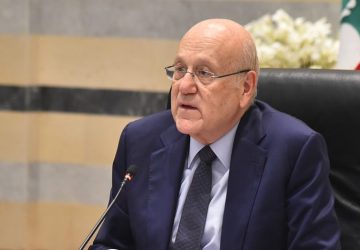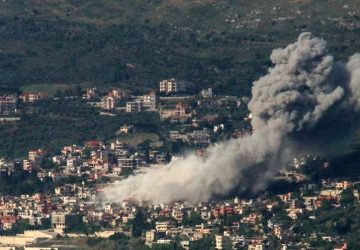The parliamentary blocs that are yet to decide to whom they will be voting during the June 14 session devoted to the election of a President of the Republic might either opt for a slogan paper or root for a third candidate, potentially Ziyad Baroud.
Listen To The Article
The MPs who have long been undecided about which candidate to vote for are yet to make up their minds. Seven months into the beginning of the presidential vacancy, and five months after the holding of the last parliamentary session devoted to the election of a president, 20 to 25 MPs are still hesitating, as they “continue to go around in circles,” as described by an opposition member.
These MPs who present themselves as centrists and refuse to tilt the balance in any direction, have yet to determine their choice for the twelfth session, scheduled for Wednesday, June 14. While some of them are about to slip new “slogans” into the ballot box, as they previously did, others are looking for a “third way” and could vote for a candidate they believe “transcends divisions.” This candidate could possibly be former minister Ziyad Baroud.
Since the last session, held on January 19, the main rival groups in Parliament, while holding steadfast to their ideas and principles, have adjusted their approach. The March 8 parties have officially announced their support for the candidacy of the leader of the Marada, Sleiman Frangieh, whom they previously tacitly supported.
For their part, the sovereigntist opposition blocs have gone from backing the candidacy of MP Michel Moawad to supporting Jihad Azour, the former minister who currently serves as the director of the Middle East and Central Asia Department at the International Monetary Fund (IMF). The Free Patriotic Movement (FPM) “converged” with them, after previously casting blank votes alongside Hezbollah, the Amal movement and their allies, before gradually starting to distance themselves from that choice.
PSP decision expected on Thursday or Friday
For its part, the Democratic Gathering bloc, which had fought with the other sovereigntist groups in favor of Michel Moawad during the 11 previous sessions, subsequently distinguished itself from the components of the opposition. The leader of the Progressive Socialist Party (PSP) Walid Joumblatt had tried to break the stalemate in the presidential election by suggesting three consensual candidates to Hezbollah in February: Jihad Azour (whose name was proposed for the first time), Army Commander General Joseph Aoun and former MP Salah Honein.
Now that Azour’s candidacy has garnered the support of four main blocs, namely the Lebanese Forces (LF), the FPM, the Kataeb and the Renewal Bloc, as well as three Change MPs and several independents, the PSP bloc must announce its official position on this matter. The decision is expected to be announced following the bloc’s meeting, which is scheduled for Thursday or Friday, June 8 or 9. According to several sources, the PSP is poised to support Azour’s candidacy.
National Moderation Bloc
Since the first electoral session, Moawad reached out to opposition members who had not come out in his favor and who had not cast blank votes alongside the March 8 blocs. Two main blocs, namely the National Moderation Bloc MPs and their allies on the one hand, and the Forces of Change MPs on the other, wanted to remain in the center from the very beginning.
The National Moderation Bloc brings together six MPs from Akkar and North Lebanon, including four Sunnis (Ahmed Kheir, Walid Baarini, Mohammed Sleiman and Abdel-Aziz Samad), one Alawite (Ahmed Rustom), and one Greek-Orthodox (Sajih Attieh). The members of this bloc are mostly former Hariri partisans. This group is allied with two Sunni MPs from Beirut, namely Nabil Badr (president of the Ansar football club) and Imad Hout (member of the Jamaa Islamiya). The eight MPs coordinate most of their positions, and consistently cast ballots bearing the inscription “New Lebanon.” They are considered to be quite close to Saudi Arabia and attentive to its directives, even if some of them deny this. They constitute, with independents like Neemat Frem, Jamil Abboud and Ihab Matar, a larger parliamentary group called the Independent Parliamentary Gathering.
According to parliamentary sources, these 11 MPs are to hold a meeting on Friday, June 9, to finalize their position. Wanting both to respect the “popular legitimacy” of the Hezbollah and Amal movement blocs, and the “Christian unanimity” around Azour, they might either end up voting in favor of “New Lebanon,” or decide to write another slogan on their ballots.
However, it should be noted that Frem, whose name appears among the consensual candidates, and Abboud could vote in favor of Azour in order not to exclude themselves from the Christian unanimity. According to certain sources, they made a commitment to Patriarch Bechara Rai to support Azour’s candidacy.
Moreover, if the National Moderation Bloc and its allies in Beirut remain “in the center” on June 14, it would probably be for the last time. Some of these MPs do not hide their frustration concerning the attitude of the Amal-Hezbollah blocs. These reject any candidate other than Frangieh. Despite being from North Lebanon, the National Moderation Bloc MPs, or at least some of them, are unlikely to vote for Frangieh, according to sources close to the bloc.
Forces of Change MPs
The Forces of Change MPs, originally 13 but now 12 after the decision of the Constitutional Council to invalidate Rami Finge as Tripoli MP, have displayed political differences within their bloc, which prompted Michel Doueihy (Zghorta) then Waddah Sadek (Beirut), to distance themselves from the bloc. These two MPs voted in several sessions for Moawad. This was also the case for Mark Daou and Najat Saliba, both members of the Taqaddom Party.
Doueihy, Daou and Sadek no longer hide their proximity to the sovereignist blocs, whose political line they share. Daou even went so far as to read the press release issued by the opposition MPs at Moawad’s house, announcing the MPs’ support for Azour.
However, the position of the remaining Change MPs remains unclear. Two of them, namely Cynthia Zarazir and Halima Kaakour, said they would neither vote for Azour nor for Frangieh, considering both candidates as part of the system that led the country to crisis.
The nine MPs of the Forces of Change Bloc voted during the last sessions for Professor Issam Khalifeh, Baroud or Honein. Several of these MPs, such as Elias Jradeh, Yassine Yassine and Paula Yacoubian, might not oppose voting for Azour.
However, because of their coordination with those of Saïda-Jezzine, namely Oussama Saad, Abdelrahman Bizri and Charbel Massaad, these MPs could agree on Baroud, knowing that Honein and Frem are also on the table.
The Saïda-Jezzine MPs, who each voted for a different candidate during the previous sessions, reject the two names currently in the race, believing that they both contributed to the country’s collapse.
Baroud could collect nine votes from Change MPs, three from Saïda-Jezzine, and perhaps that of Deputy Speaker Elias Bou Saab, who had already voted for him, as Jradeh had done.
Of note, the names of Baroud, Honein and former minister Nassif Hitti were put forward by the Forces of Change MPs as part of an initiative they had launched. Baroud received his first vote during the fifth electoral session held in November 2022.
The 65 votes
The sovereigntist blocs are making every effort to guarantee 65 votes for Azour in the first round, as 86 votes are required for election in the first round while 65 are sufficient in the second round. Even if the March 8 blocs cause, as they have done in all previous sessions, a lack of quorum in the second round, the simple fact of having succeeded in securing 65 votes for Azour will convey a very clear message internally and externally.
“It would infer that we are capable of electing a president, but are prevented from doing so,” an opposition source said.
To secure these 65 votes, the support of the PSP and FPM blocs, with those of certain independents, would be sufficient. If this scenario unfolds, the votes of the undecided MPs will be of much less importance, according to MPs from blocs supporting Azour.
Meeting in Riyadh
Meanwhile, some MPs are keeping an eye on the meeting which could bring together senior officials from the five countries of the “Paris meeting” in Riyadh on Thursday, [June 8], on the sidelines of the meeting of the international coalition against the Islamic State. American, French, Saudi, Egyptian and Qatari officials could discuss the Lebanese presidential election, according to certain sources.
The Qatari envoy, who recently held talks with Lebanese leaders in Beirut, could launch a new initiative and propose certain names for consideration, as indicated by these sources.
The anticipation surrounding the outcome of this meeting could explain the “silence” observed among several blocs.
A sovereignist MP emphasized in this vein, “We hope that the meeting participants will be convinced that the opposition MPs have a serious candidate enjoying broad national support and Christian unanimity, and that their will must be respected.”





